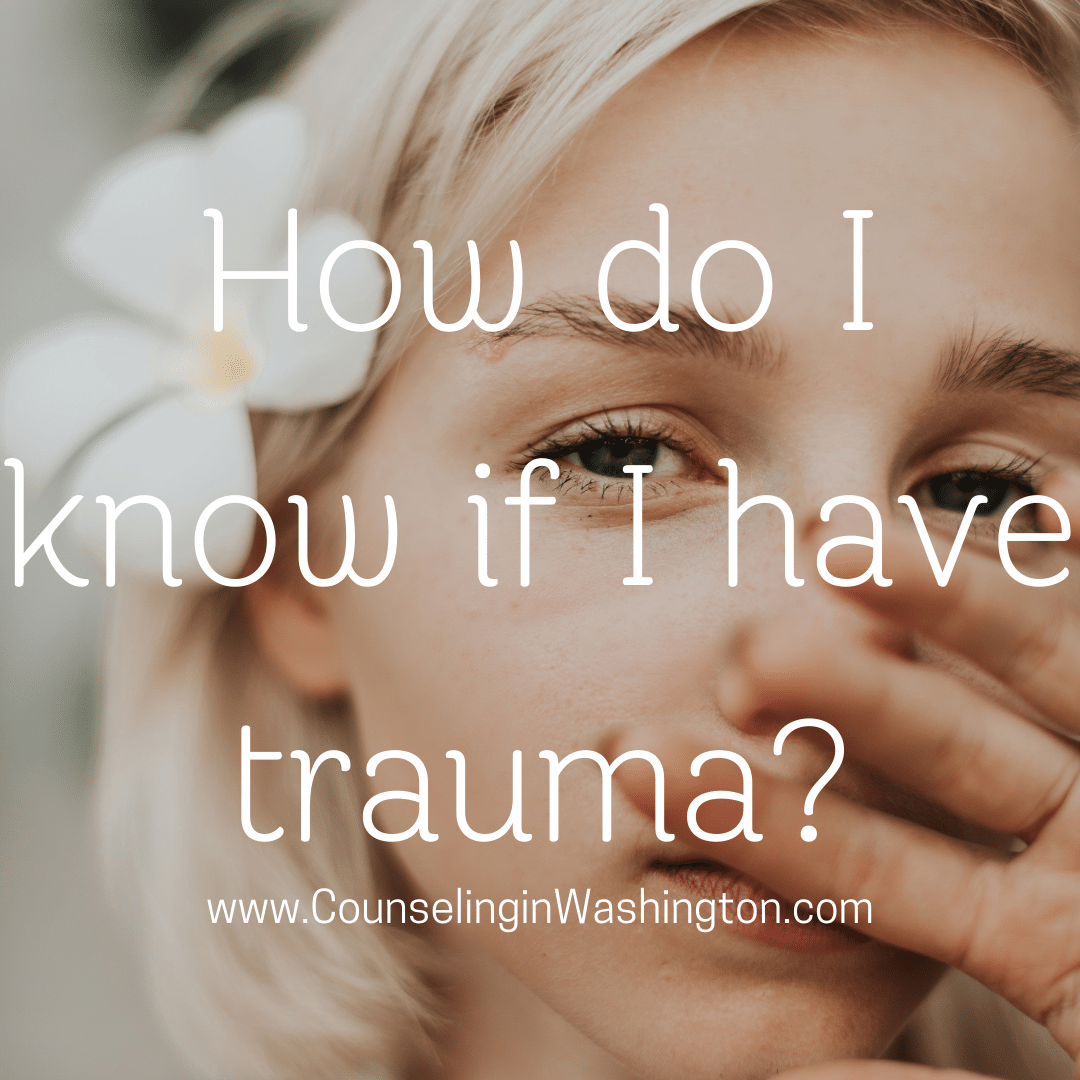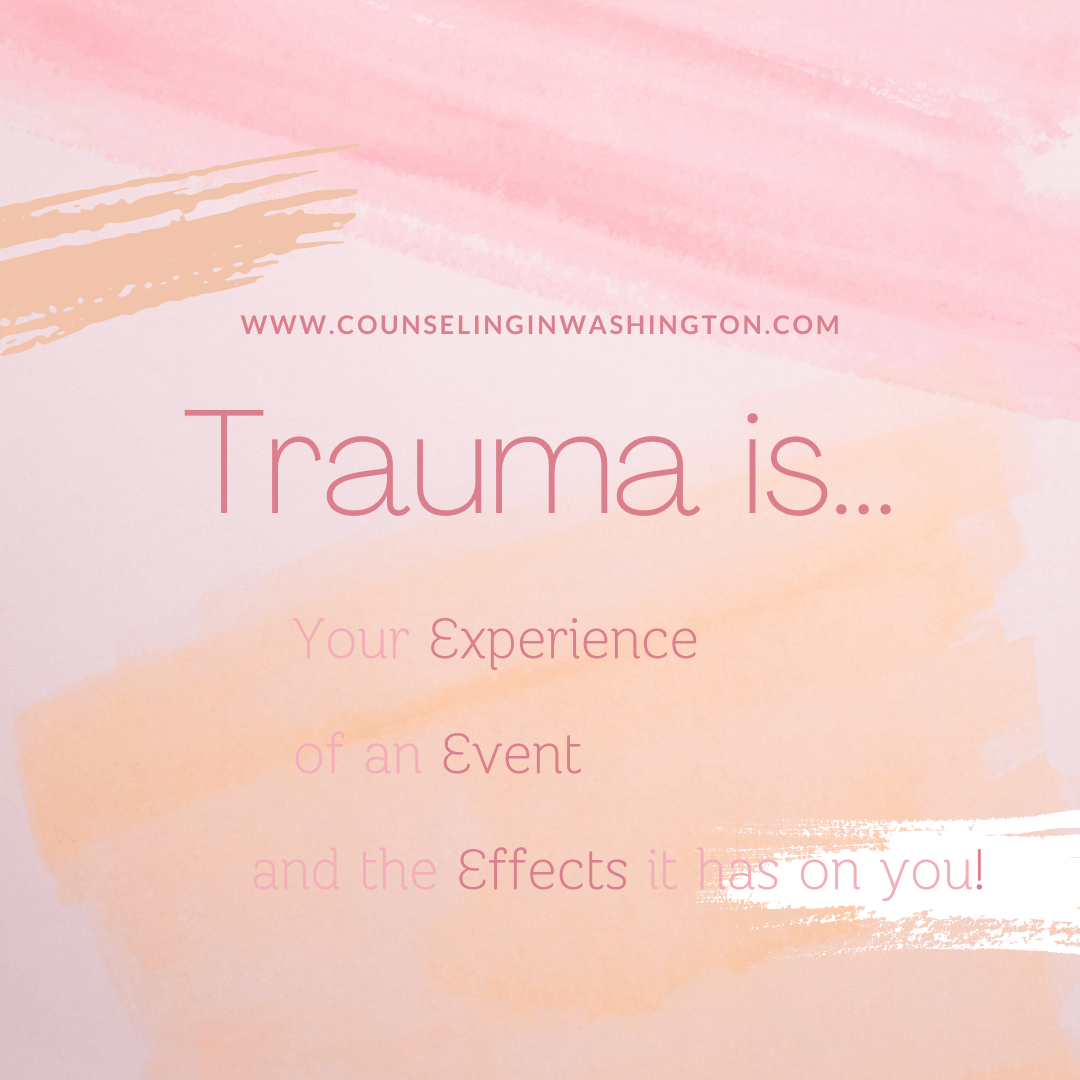How do you know if you have experienced trauma?
You’re not sure if you have trauma or if you are overreacting.
How do you know if you have experienced trauma? As a trauma and relationship counselor for women in Tacoma, WA, Katie answers this question with three E’s that can help you determine if trauma has affected you.
You have some relationships or experiences that have been upsetting. Maybe thinking of them has brought tears to your eyes, or you’ve found yourself thinking about them again and again. Found yourself reviewing the memories in your mind -or worse- not being able to stop thinking about them.
As a trauma and relationship counselor in Tacoma, WA I often have clients tell me that they aren’t sure what they’ve experienced qualifies as trauma. They don’t check any boxes on the ACES survey (Adverse Childhood Experiences Survey) and often report feeling like they’ve had a “blessed”, “safe”, or “privileged” childhood. But trauma isn’t defined only by if you have experienced childhood violence, abuse, neglect, or sexual assault.
In fact, trauma, is a very personal experience.
Trauma can be a very big and complex topic, but I like to start by explaining trauma to my clients simply using the three E’s of trauma. It’s easy to remember, and you can do a quick self-assessment to determine if what you experienced qualifies as “trauma”. I’m sharing it here so you can decide for yourself if you’ve experienced traumatic events or relationships (psst: everybody has!) and then decide if any of this trauma is unresolved, or if you would like to talk to a trauma therapist or relationship counselor to move through the trauma and improve your mental health.
Trauma is based on: An Event, Your Experience of the Event, and the Effects of your Experience of the Event
One of the most common traumatic events anyone can experience is a car accident. I’ve heard this example used before when talking about trauma, so I’m resharing it here.
Let’s say 4 people experience a near-miss car accident.
Event: each of them are involved in the same event: a potential or minor car accident.
Experience: each of them may have a very different experience of the event. The driver may notice that the car may make impact with another car, but feels confident that they will be able to slow and maneuver the car enough to minimize the impact. Sudden braking and some under breath profanity may occur. The driver knows brakes are coming. The front passenger may see that the cars are about to hit and prepares for impact. They are terrified watching the scene with no control over stopping it. A back passenger is asleep with headphones on and barely wakes up when the car jolts to a stop. The fourth passenger can’t see outside, but is excited by the language and the sudden stop, and crunching noise of bumpers. It reminds them of the bumper car rides and the monster truck rally they went to recently. Adventure! Each experienced the same event, but differently.
Effects: The driver may increase their alertness on the road, but with little to no trauma experienced. The front passenger may experience quite a bit of trauma and be afraid to ride as a passenger, in the front seat, or with this driver. They may have nightmares or may have had their life flash before their eyes. The sleepy passenger might just have gone back to sleep, and the adventure passenger is chanting to do it again.
Feeling out of control can increase the likelihood of a trauma response -and if its left untreated- has the potential to become PTSD (Post Traumatic Stress Disorder)
Trauma is a very personal experience. Feeling out of control of a situation can increase the likelihood of a trauma-response, and so can experiencing repetitive (often called complex) trauma. And traumatic experiences can happen to anyone, at any time, anywhere. Even if you had a “safe”, “blessed”, or “privileged” childhood.
One of the best ways to address traumatic experiences or relationships is to attend to them as soon as possible.
This can help your body and brain process these memories and emotions before they get too deeply into your memory. Traumatic experiences that are not attended to can result in PTSD or complex trauma symptoms that if left untreated can be very debilitating and even potentially life threatening due to feelings of hopelessness, thoughts of self-harm or suicide, or even homicide. On a lesser -but still disruptive- scale they can affect your relationships, your ability to work, and your ability to feel safe and connected in the world around you and in your own body and mind.
When it comes to trauma, remember the three E’s and know that the best person to determine if you have experienced a traumatic event or relationship is you.
Your trauma therapist or relationship counselor can help you process the trauma so that you can heal and learn how to trust again. They can teach you skills to cope with the memories, provide treatments and interventions that help your brain and body to express the feelings and memories safely, and provide a safe space for you as you work through the memories, thoughts, and feelings of the experiences.
If you think you have experienced one or more unhealed traumatic experiences or relationships, therapy can help you regain control, learn to trust again, and feel better.
Hi, I’m Katie Lorz, a Trauma and Relationship Therapist for Women in Tacoma, WA. I love helping women heal from institutional trauma, intergenerational trauma, relational trauma, complex trauma, religious trauma, and any other traumatic experiences you may have. I use body-based (somatic) therapies and trauma-informed treatment to help my clients process acute traumas like car accidents, dental anxiety, and break ups or relationship difficulties. For clients that want to do deeper work, I enjoy helping clients heal from religious trauma, vicarious trauma, caregiver fatigue, people pleasing, overwhelm and burn out, intergenerational trauma, relationship trauma, childhood trauma, and much more.
If you are a woman seeking therapy in Washington and would like to see if therapy might help you have less anxiety, better relationships, or more self confidence and motivation, please reach out for a free 15-minute consultation call by filling out my contact form.


